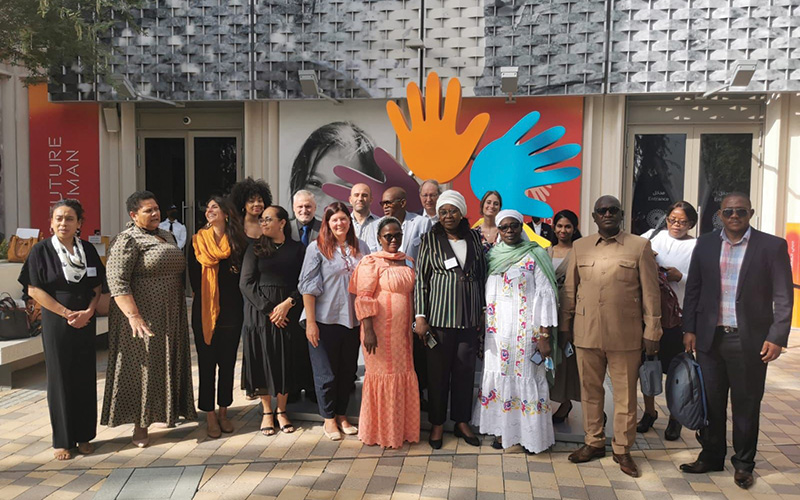
Sally with delegates in Dubai, 2022
A powerful data tool developed by international child development researcher Professor Sally Brinkman and former research assistant Tom Brown – now studying at Harvard on a full scholarship – could improve early childhood support for children around the world after being launched in Dubai this year. Created for UNESCO, the Holistic Early Childhood Development Index is part of the growing web of global work being undertaken by The Kids Research Institute Australia researchers.
When Professor Sally Brinkman travelled to Indonesia in the mid-2000s to undertake her first international development collaboration with the World Bank, it was only the second time she had ever left Australia.
“I grew up relatively poor myself, so international travel wasn’t part of my life experience,” Professor Brinkman said.
“But being exposed to such different cultures and levels of poverty, and understanding the context in which children are raised in such different circumstances, that really spoke to me.”
In the almost 20 years since that trip, Professor Brinkman has left the country more times than she can count, visiting nations across the globe to explore how her research can help governments better support children and families through improved early childhood education, care and development (ECD) services. Much of her work centres around a series of human capability indexes she has developed to help countries rate their current ECD performance, identify what they could do differently, and evaluate whether interventions they then implement are making a difference.
In 2017 Professor Brinkman was asked by UNESCO – the United Nations Educational, Scientific and Cultural Organization – to develop an index that could help UN Member States assess their progress against Sustainable Development Goal 4.2.
The goal, one of 17 set in 2015 by the UN General Assembly, seeks to ensure that by 2030 all girls and boys have access to quality early childhood development, care and pre-primary education so they are ready for primary education. In March this year, Professor Brinkman and UNESCO jointly launched the Holistic Early Childhood Development Index (HECDI), with a companion manual, at a meeting in Dubai attended by senior policymakers and finance and education ministers from more than 70 countries. The meeting was hosted by global philanthropic organisation Dubai Cares, a key partner in the work.
“The aim of the HECDI is to help countries quantify factors which influence children’s learning environments, such as health, nutrition, child and social welfare,” Professor Brinkman said.
The index allows countries to compute an indicator even if they are missing data on some factors, for example, disability or domestic violence. It also applies a unique method of averaging to help create a more meaningful league table.

“For those in the maths field, it would probably be classified as quite elegant as far as indexes go. It’s a nice little computation that’s still relatively simple for countries to use.”
Professor Sally Brinkman

The goal is for the HECDI to be used by all 193 UN Member States to help them measure their support for children. Chad, Eswatini and the Seychelles have already expressed interest. “The ultimate aim is to ensure every child can access efficient, coordinated early care and education in a way that sets them up to thrive throughout life,” Professor Brinkman said.
Making global connections
The work with UNESCO and the World Bank has put Professor Brinkman into close contact with key movers and shakers from countries all over the world, paving the way for further collaborations.

“It’s just immediate contact at ministerial level for literally every single country in the world, so it’s an opportunity to develop really strategic, important networks that then enable me to build the research agenda in terms of international child development."
Professor Sally Brinkman

“But it’s also an opportunity for me to understand the needs of the different countries – the different challenges they face and what supports they may need.”
As difficult as it can be to work with countries whose political imperatives can change in the blink of an eye – as governments and individuals rise and fall – Professor Brinkman finds the work deeply rewarding.
“Clearly my own experiences growing up aren’t the same as the families in the countries where I’m working – many of them have completely different levels of poverty – but I do understand that if you have that base level of universal support, with targeted strategies on top of that, it’s going to help parents and communities better support their children,” Professor Brinkman said.
“I know from my own experience that the right kind of support at the right time in a child’s life can make all the difference – that’s what really drives me.”
